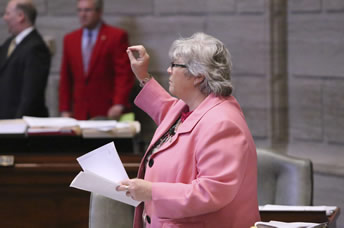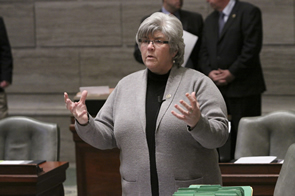
Website | E-Mail Me | Biography | Newsroom | Subscribe | Unsubscribe
|
| Spring Capitol Report |
Contact: Janson Thomas— (573) 751-2420 |
|
| Legislation Sent to Governor |

| Shown above, Sen. Walsh speaks on the floor of the Missouri Senate during the 2013 Legislative Session |
|
On Friday, May 17, at 6 p.m., the 97th General Assembly adjourned for the 2013 legislative session. As my first in the Senate, it was an incredible experience. More than anything, though, it was an honor to represent the citizens from our area in the State Capitol.
More than 180 bills were sent to the governor before the final gavel fell on session. One of the most high profile measures we approved was Senate Bill 1, which addresses the insolvent Second Injury Fund (SIF). In 2005, the Legislature capped the surcharge rate on workers’ compensation insurance premiums that fund the SIF. Three years later, the recession of 2008 hit, and as unemployment rose, workers’ compensation rates fell, bringing in less and less money for the fund. Today it’s broke, with hundreds of claimants still waiting on benefit checks from years ago, and lawmakers have struggled with a solution for the past few sessions.
Senate Bill 1 temporarily increases the business surcharge to allow the SIF to pay its obligations. It also moves most occupational disease claims back into the state’s workers’ compensation system. Because the bill’s provisions do not take effect until Jan. 1, 2014, the Second Injury Fund will not see increased revenue from the additional surcharge until April 2014—the end of the first quarter of next year. This will require the state to continue to manage withheld awards for some period of time.
While, the state is currently withholding payments totaling in excess of $32 million from more than 1,200 injured workers the Missouri, the Attorney General's Office is immediately assessing when back payments could begin to be made to injured workers.
House Bill 142, which contains a provision identical to my legislation Senate Bill 275, will allow low-income customers to take advantage of energy efficiency programs offered by electric companies.
Current law prohibits customers who have received a tax credit for low-income housing or historic preservation from receiving monetary incentives offered by electric companies for energy efficiency programs, including low-income housing construction projects. Senate Bill 275 modifies the eligibility so that low-income customers can benefit from the programs. The bill is estimated to save low-income residents an average of $120 annually on utility payments.
Under current law, if a teenager in the foster system chooses to leave at the age of 18, that’s it. They are no longer wards of the state, and there’s no reversing the decision, even if they encounter problems when they enter the real world.
Unlike a lot of teenagers, these teens don’t have a safety net to catch them if they fail. They lack a lot of the resources and guidance other teenagers have. Many become homeless or incarcerated within a few months of leaving, and it begins a cycle that is incredibly hard to break.
The Legislature sent to the governor Senate Bill 208, which allows teenagers who have left foster care to petition the court to return to the custody of the Children’s Division of the Department of Social Services. This legislation will let those teenagers who faced difficulties on their own return to the care of the state until they’re 21 years old and give them a better chance at becoming responsible, productive citizens, which benefits the entire state.
Senate Bill 197 would change how public health authorities address the treatment and prevention of tuberculosis, or TB, a common infectious disease that mostly attacks the lungs and is spread through the air. Under the bill, higher education institutions in Missouri would have to implement a targeted testing program on their campuses for all on-campus students and faculty upon enrollment.
In addition, Senate Bill 197 contains a provision identical to legislation I filed, Senate Bill 421, which would require Missouri’s colleges and universities to provide a brochure informing students and their families about meningococcal disease, commonly referred to as meningitis. This disease affects the lining of the brain and spinal cord when it is infected with certain bacteria. Meningitis is easily spread by individuals who live in close quarters, making it so important that college students and their families be aware of ways to protect themselves from this harmful disease.
Before conclusion of this year’s regular legislation session, the Senate also gave its unanimous approval to several concurrent resolutions, measures that express the opinion of will of the Senate and House and are adopted by both chambers. Senate Concurrent Resolution 3, which I sponsored, recognizes Sept. 26 as Mesothelioma Awareness Day in Missouri.
|
| A Missed Opportunity |
There were a number of pressing issues before us this year, none of which were more important than considering Medicaid expansion under the Affordable Care Act (ACA). This expansion would have given 300,000 Missourians access to health care. These are families that are currently forced to make choices between going to the doctor and putting food on their table. Thousands of Missourians are denied the health care they need, often with disastrous long-term effects on their health.

| Shown above, hundreds supporters of the Medicaid Expansion gather for a rally in the rotunda at the Missouri Capitol on April 16, 2013. |
|
We could have done something about that this session. Under the ACA, the federal government would pay 100 percent of the cost of expansion for the first three years and would never pay less than 10 percent of the cost. A University of Missouri study released earlier this year found expanding Medicaid would create 24,000 new jobs in the first year alone, creating enough new tax revenue for the state to cover its share of the cost of expansion. Missouri now stands to lose billions of dollars in federal funding and nearly 300,000 working Missourians will continue to go without needed health care services as a result of lawmakers’ failure to expand Medicaid.
We missed an incredible opportunity to do some real good for the people of our state. This was a measure that would have had immediate, concrete effects on our constituents. It’s not a tax incentive bill that may or may not create jobs. It’s not a deregulation measure that may or may not make Missouri more attractive to businesses. It was a straightforward proposal that would have helped our citizens, which is why we’re in the Capitol.
Numerous minority members tried to amend provisions for the expansion to legislation, but it was routinely defeated. The main argument against the expansion was financial. Opponents claimed we couldn't afford to spend more money on social services. Yet these same legislators approve a tax credit system that spends upwards of half a billion dollars a year. These same so-called "fiscal conservatives" agree to a tax cut on corporations, which are currently enjoying historic profits.
Sound policy balances both sides. Of course we need economic development in Missouri. We need new jobs and new companies to come to our state. But our first priority should always be to the people, and the Medicaid expansion was one of the best chances we’ve had in decades to make a real difference in the lives of hundreds of thousands of citizens. The fact that we passed on that opportunity, mainly out of politics and a desire to be disassociated with the ACA’s main standard bearer, our president, is reprehensible.
The Legislature has agreed to create an interim committee to study the expansion and possible ways to implement it here in Missouri. The General Assembly has looked past its differences before to do what’s right for the state. I can only hope we do that again.
|
| Missouri's FY 2014 $25 Billion Budget |
The Missouri Legislature sent the 13 bills that make up our state’s $25 billion budget to the governor on Thursday, May 9, a day before the constitutional deadline. As a member of the Senate Appropriations Committee and a participant in the budget conference committees, I played an integral part in crafting our budget for the next fiscal year.
There will always be differences between legislators on how and what we should fund in state government. It’s the nature of politics. The important thing, though, is we compromise and do what’s best for our state, which is what I saw throughout the budget process. It is an incredible responsibility and an overwhelming task. My colleagues handled it with grace and patience, and I was honored to be a part of the process.
The state spending plan for the next fiscal year includes a $66 million increase in funding for K-12 education and increases funding for higher education by $25 million.
Specific to the 13th District, the spending plan includes $16 million of state funding for the Bellefontaine Habilitation Center in North St. Louis County, a slight increase from the center’s FY 2013 budget of $15.8 million.
Additionally, the FY 2014 budget proposal includes a total of $76 million for the state’s seven veterans’ homes, a $2.2 million increase from the previous fiscal year which includes the St. Louis Veterans’ Home in North St. Louis County.
Critically important nursing staff at these veterans’ homes are slated to receive a 2 percent raise with a 4 to 6 percent raise for certain nurses, on top of the across-the-board $500 raise for all state workers included in the budget.
For more detailed information on Missouri's FY 2014 budget, click here or visit www.senate.mo.gov.
|
| Standing Up For Working Families |
 |
| Shown above, Sen. Walsh debates fellow senators on the floor of the upper chamber on April 11, 2013. |
|
Most people believe the main job of a legislator is to make laws. And while this is our overall goal, blocking bad policy is an equally important duty. The Minority Caucus was successful in blocking a number of bills that would have negatively impacted the working families of our state.
Prevailing wage laws protect contractors from having their wages slashed to win bids on government projects. Missouri enacted the program a number of years ago, and for most of that time, it worked. However, in recent years, it’s become apparent the program is in need of some reform. The prevailing wage is based on surveys from contractors in the area where the work is to be done. Many employers don’t submit these surveys, especially in more rural areas where less contract work is done, making it difficult to calculate an accurate wage.
Instead of finding a solution to this specific problem, such as Senate Bill 274, which I sponsored, though, there were multiple attempts to either do away with the prevailing wage this year or water the program down to the point of uselessness. We cannot allow this to happen. Ultimately, a prevailing wage bill was sent to the governor that will give rural counties a more accurate wage amount while still protecting the prevailing wage for contractors in our area.
Members of the Minority Caucus were successful in blocking a bill that would have defined “maintenance” as routine, recurring working that doesn’t exceed $75,000. Under this definition, maintenance work is not subject to prevailing wage, which would have allowed contractors on public works projects to bid projects at less than $75,000 to avoid paying the prevailing wage. It was an underhanded attempt at cutting the legs out from our prevailing wage system. I spoke adamantly against the bill on the floor and led my fellow minority caucus members in stopping the legislation. The measure died on the floor.
Despite the best efforts of the Minority Caucus, the Legislature also passed a massive tax cut to businesses and corporations as a misguided attempt to compete with Kansas, which is currently going broke. What few seem to realize, though, is that there are almost zero business surveys showing low tax rates are a major consideration of where a business relocates or expands. In fact, Missouri already has one of the lowest tax burdens in the country.
If signed into law, these tax cuts will reduce state revenue by $500 to $800 million when fully implemented. At the same time, we’re $600 million shy of fully funding our K-12 foundation formula, our roads and bridges are falling apart, and our state workers remain the lowest paid in the nation.
Instead of competing with states that are quickly approaching insolvency, we should be focusing on passing true economic development measures, ones that will create real jobs, like investing in our state’s infrastructure and education systems.
Thankfully, the governor recognized the consequences of implementing such a misguided tax cut bill and chose to veto the measure in early June. In his veto letter, he stated, “House Bill 253 is an ill-conceived, fiscally irresponsible experiment that would inject far-reaching uncertainty into our economy, undermine our state’s fiscal health, and jeopardize basic funding for education and vital public services.”
|
| Teaching Teenagers Safe Driving Practices |
|
Now that summer is here, students will spend their break with friends and enjoy the numerous fun activities in our area. Teenagers will also take to the roads as they embrace that first taste of freedom a newly minted driver’s license gives you.
However, it is critical we teach our youngest drivers safe driving practices. Teens are at particularly high risk for motor vehicle crashes due to the fact that these young people are not as experienced of drivers and are more likely to speed, use poor judgment and may not be able to recognize hazardous situations on the road.
The Missouri Department of Transportation notes that 34 percent of Missouri teens don't buckle up, and that one in four Missouri traffic crashes involve a young driver. Between 2010 and 2012, more than 240 teens were killed in traffic crashes, and of those killed, 78 percent were not using a seat belt.
Please discuss safe driving techniques with your teenagers and stress how important it is to buckleup. For additional resources, visit the Missouri Coalition for Roadway Safety website at www.savemolives.com.
|
| The Importance of After School and Summer Programs |
|
Summer programs for children provide enriching opportunities that help prevent summer learning loss for students. Research shows that many children lose ground relative to their peers during the summer months. Quality summer programming can help keep students engaged in learning throughout the three-month vacation. It gives these students an advantage in the following school year.
These programs are also a huge asset to working families by providing a safe place for children to go while parents are at work. These summer programs are provided by local school districts, YMCAs, Boys & Girls Clubs, churches and parks and recreation programs.
After school programs are another beneficial service provided by many schools and organizations. These programs give students guided assistance with homework and a safe place to go before their parents get off work. In addition to keeping children safe, research shows that quality after school programming plays a part in reducing negative juvenile behaviors, increasing academic performance and supporting the growth of social and emotional well-being.
I strongly encourage parents in our area to consider enrolling their children in an after school or summer program, which feature many fun, summer-related activities. The better we can prepare our students, the brighter their future will be.
|
| Free Weatherization Assistance Program |
The Community Action Agency of St. Louis County Inc. (CAASTLC) is offering a program that offers free weatherization to local citizens. Weatherization helps to reduce energy costs for income eligible families by improving the energy efficiency of their homes. CAASTLC uses advanced technologies and qualified contractors to reduce the energy costs of eligible participants at no cost to the client.
The program is funded with the support of the U.S. Department of Energy, the Missouri Department of Natural Resources’ Division of Energy, Laclede Gas and Ameren Missouri.
Weatherizing your home is a great way to save money on your energy bills, which have steadily risen in recent years. I strongly urge constituents to visit www.caastlc.org or call (314) 446-4436 for more information.
|
| Visitors to the Capitol |
|
|
| Shown above, Sen. Walsh with 7th grade students from Salem Lutheran School during their visit to the Capitol on April 2, 2013. |
|
| Shown above, Sen. Walsh with 8th grade students from St. Rose Philippine Duchesne Catholic School during their visit to the Capitol on April 17, 2013. |
|
|
| Shown above, Sen. Walsh with 4th grade students from Grace Lutheran School during their visit to the State Capitol on April 23, 2013. |
|
| Local District Events |
There are a number of wonderful, free events held in our area throughout the year by local and state organizations. These occasions feature many fun activities for both adults and children and are a wonderful way to strengthen the bond within our communities.
There are two upcoming events in our area for the month of June:
Hispanic Festival
When: Saturday, June 22 - Sunday, June 23
Where: Knights of Columbus Park in Florissant
For more information call (314) 837-6100
North County Community Festival
When: Saturday, June 22, from 4 p.m. - 9 p.m.
Where: Jamestown Mall Auto Center Lot
For more information call (314) 355-0400 Ext. 128
|
 |
|
|
|